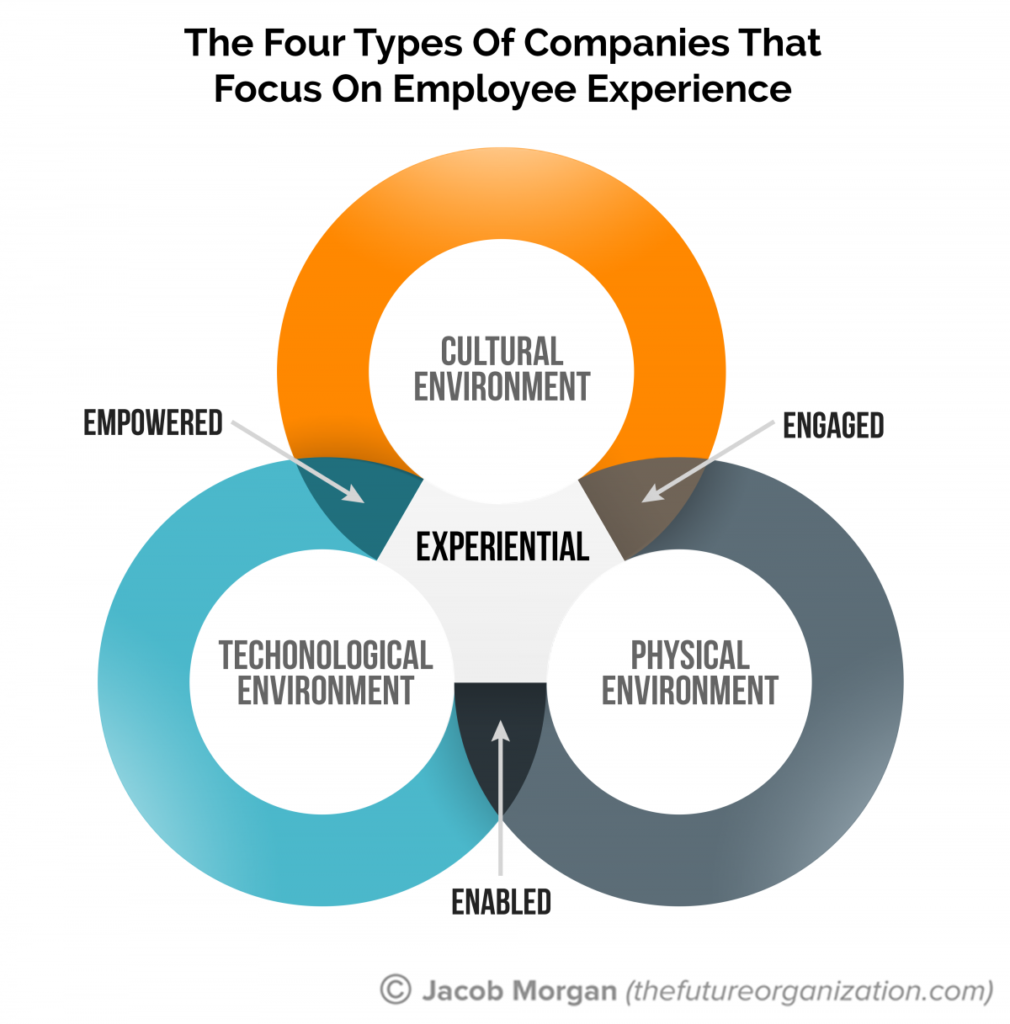A few weeks ago I wrote about the three types of environments that impact every single employee experience (the physical, the cultural and the technological) at every company around the world. From these environments there are four types of organizations that emerge. The type of organization depends on which one of the three environments the organization has initiatives around. Although these organizations are not perfect I decided to take a positive spin when naming them instead of focusing on things that they are lacking. The types of companies that focus on the employee experience are either: empowered, enabled, engaged, or experiential. Let’s take a look at each one.

Empowered
These types of organizations focus on giving employees the right tools they need to do their jobs while creating a sense of purpose at the organization. Typically a strict formal hierarchy is absent and employees have a strong sense of autonomy, accountability, and responsibility. Collaboration and transparent communication is also embedded into how work gets done. Employees also have access to modern technologies needed to work productively and efficiently. These can be internal social networks, video conferencing solutions, modern employee engagement tools, real-time feedback platforms, and the like. The emphasis is on the cultural and the technological environments. However, in empowered organizations the physical space needs work. So the company might have a great culture and employees might have all the tools they need to do their jobs, but employees also don’t really like showing up to work because their office environment looks and feels like a hospital.
Enabled
These types of organizations have beautiful office environments that cater to multiple modes of working. Open floor plans, conference rooms, lounge areas, cafes, collaboration spaces, privacy corners, and all the other components of a modern work space are abundant and beautifully designed. As with “empowered” organizations, employees also have access to various technologies that they need to get their jobs done. In this type of an organization though, the cultural component is what is lacking. Employees don’t feel a strong sense of purpose and oftentimes a strict hierarchy is present which makes communication and collaboration difficult and tedious.
Engaged
In this scenario the organization does a great job of creating a sense of purpose for employees. As mentioned above a strict hierarchy is not typically present and communication and collaboration flows throughout the organization. This type of an organization also places a strong emphasis on creating a physical environment where employees actually want to show up, meaning the office spaces are beautiful. Still, in this type of an organization although employees are motivated and engaged in their jobs they don’t have all the right tools to get work done. They enjoy their jobs and the work they do but they don’t feel enabled to work as productively, efficiently, and as collaboratively as they can.
For the most part these are the three types of organizations that have emerged today. Sometimes an organization will focus on just one out of the three components above but for the most part organizations are trying to focus on two out of the three. However, I’m seeing the the focus on the employee experience is a huge part of the future of work which brings up this new fourth type of an organization.
Experiential
This is a new breed of organization that makes considerable investments into all three employee experience environments. The organization gives employees modern tools to do their jobs, provides spaces that employees actually want to work in, and creates a culture with a strong sense of purpose and belief in what the company does and how employees can contribute. Companies like Cisco, Linkedin, Whirlpool, Mars Drinks, Enerplus, NCR (all members of The Future of Work Community which is how I know what they are doing), and others are all focusing. The experiential organization is the one that I believe is going to prevail and win the war for talent.
Looking at these types of organizations, what type do you work in?
Jacob Morgan is a keynote speaker, author, and futurist. You can invite Jacob to keynote your next conference, subscribe to his videos on Youtube, check our his podcast, or subscribe to his newsletter!
Comments